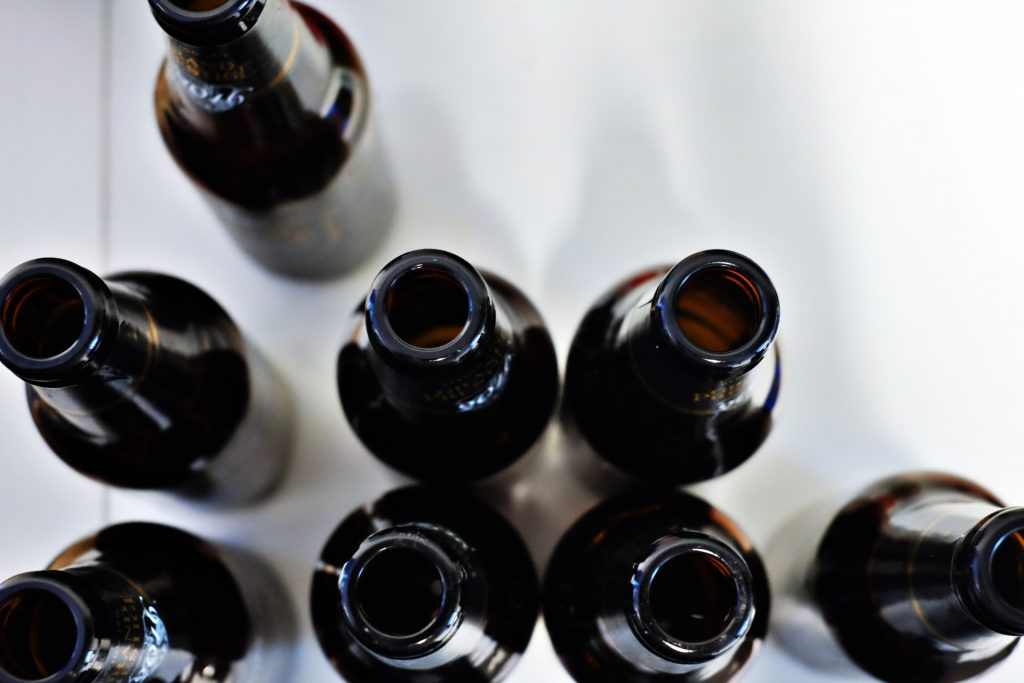What Is the Role of Denial in Alcoholism?
Denial is one of the biggest barriers to treatment for alcohol addiction. When people can’t admit to having a problem, there’s no way to find a solution.
According to SAMHSA’s 2019 National Survey on Drug Use and Health, 21.6 million people in the United States needed substance abuse treatment in 2019, yet only 4.2 million received it. Several factors contributed to this gap, but denial was one of the most significant: Of those who needed but did not receive substance abuse treatment, just 4.3 percent agreed that treatment was necessary.
Why is denial so common? In this post, we’ll discuss how and why denial happens, its role in addiction, common signs, and how to help someone who may be in denial.
What Is Denial?

Denial is defined by Merriam-Webster as “a refusal to admit the truth or reality of something.” In psychology, it’s a defense mechanism to avoid confronting a personal problem. It’s extremely common for people with alcohol use disorder (AUD) to resist the reality of their drinking problem.
Research shows that people with alcohol use disorder often downplay the severity of their drinking. Due to shame, it is common for someone with AUD to not be fully forthcoming in sharing the impact alcohol has had in their life.
And denial doesn’t only come from people who struggle with drinking; their family and friends are sometimes in denial too. This enables the person to stay in denial, even as the consequences of their drinking become more severe and noticeable.
Causes of Denial in Alcohol Use Disorder
Asking for help or admitting to struggling with a problem is hard for many people, not just those who struggle with their use of alcohol. Admitting a problem means facing difficult truths and doing hard work to overcome the issue, which is challenging. Sufferers of alcohol use disorder commonly tell themselves they can quit any time, or that their drinking is under control and not that serious.
Stigma
Stigma is one reason people struggle to admit to having a drinking problem. Addiction is commonly viewed as a shameful character flaw, resulting in a fear of social rejection. Unfortunately, society judges and stereotypes those who have substance use disorders, and in turn those who struggle with substance use disorders internalize society’s messages. People who suffer from substance use disorders often struggle to admit to themselves that they have an issue, out of fear that this problem would make them weak or immoral.
Fear of Treatment
Sometimes, people feel afraid or uncertain about treatment. They might think it’s too expensive and time-consuming, or that it won’t work for them. They tell themselves that treatment is for serious addicts, and they don’t belong in that category.
Not Ready to Stop
Of course, some people simply aren’t ready to stop drinking. Alcohol may be a big part of their social life and friendships, or a coping mechanism for trauma, mental health issues, and severe stress. Imagining a life without alcohol might feel too difficult and scary.
Cognitive Impairment
Some researchers also propose that denial may be the result of cognitive impairments linked to alcohol use disorder. People with AUD may have difficulties with insight, working memory, complex thought, and problem solving.
People with alcohol use disorder sometimes have reduced capacity for organizing and analyzing available evidence to draw a conclusion. This may cause rigid thinking or concreteness of thought, making it hard to change their minds on a topic like whether they have a serious drinking problem.
These researchers argue that severe denial in the face of overwhelming evidence is consistent with cognitive impairment.
Denial Feels Like the Easier Option
For many who struggle with alcohol use disorder, it’s much easier to pretend that the problem doesn’t exist. That way, there’s no need to make major lifestyle changes or face difficult emotions. They don’t have to open themselves to judgment or navigate the unknown challenges of treatment.
Although denial seems easier, it’s much harder in the long run. It cuts off the possibility of positive change, leading to a lifetime of issues with health, finances, and relationships.
Signs of Denial
There are several signs of denial to look out for in your loved ones or in yourself. Be aware of the common forms of denial, and consider whether they are familiar to you.

- Dishonesty and concealment: Hiding a drinking problem and not being truthful about it is a frequent form of denial. For instance, someone might lie about not being at the bar, downplay the number of drinks they had, or bury empty bottles in the trash can.
- Blame: People may blame the consequences of their drinking on other factors. Examples include blaming poor driving on fog, or bad choices on peer pressure or just having fun with friends. Complaints about work performance can be blamed on a harsh boss, and a hangover may be attributed to staying up too late or being sick.
- Dismissiveness: If you mention your concerns about your loved one’s drinking, they may say you worry too much or are blowing the situation out of proportion. You might hear phrases like, “It’s not that bad,” or, “I don’t even drink that much…stop making such a big deal out of it.”
- Avoidance: Avoidance means walking out of the room when you try to discuss drinking, changing the subject, or saying, “We’ll talk about this later.”
- Comparison: Another form of denial is drawing a comparison to someone seen as a more serious drinker. For instance, your loved one might say, “You act like I’m falling down drunk like Cheryl,” or, “If I was an alcoholic, don’t you think I’d have been fired by now like Dan?”
You may even find that if you continue to press the issue, your loved one gets angry. You may be called judgmental or nosy, or told to mind your own business. Anger and defensiveness suggest that your loved one has some awareness of a problem but is afraid to face it. In other words, they are in denial.
How to Help Someone in Denial
If someone is in denial about their drinking, there’s no immediate way to improve the situation. They will likely continue to ignore the problem, refuse treatment, and dismiss your concerns. So, what can you do to help someone in denial?
Don’t Enable
First, don’t make excuses for them or enable their drinking. If you cover for your loved one by lying to their boss, for example, they won’t experience the negative consequences of their drinking and will remain in denial. Set clear boundaries and don’t make denial easier.
Be Compassionate
When you address your loved one’s drinking, use compassion and empathy. Avoid criticizing and shaming, and focus on highlighting your love and concern. Acknowledge the positives and listen to their response, even if you don’t agree.
Choose a good time to talk, such as when both of you are calm and your loved one is not currently under the influence. Yelling at your loved one while they’re drunk or bringing up their drinking in the middle of an argument is not effective. In fact, it may drive them even deeper into denial.
Offer Solutions
Finally, present solutions. It’s easier to acknowledge a problem if there’s a way to solve it. Offering a solution shows that you aren’t just judging or attacking; you are trying to help. Research treatment options and share them with your loved one. They might not be ready to accept help just yet, but you’re at least planting a seed and showing that there is a way forward.
Today, there are more treatment options than ever before, including online programs like Ria Health. Getting help online means less disruption to your loved one’s schedule, less stigma, and significantly lower cost than traditional rehab. Best of all, it’s often more effective than traditional options: Our members reduce their drinking by an average of 75 percent within the first year.
Learn more about how Ria Health works, or sign up for a free call to find out more about our program.
Will insurance cover treatment? Verify Coverage
Have Questions? Call (800) 504-5360



